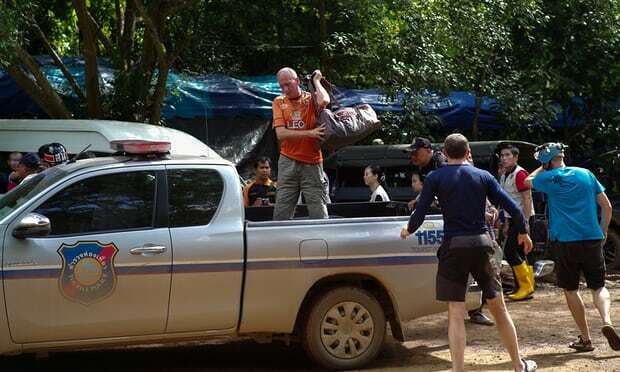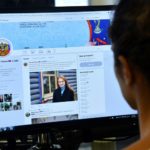A British cave diver who was instrumental in the rescue of 12 children trapped in a northern Thailand cave says he is considering legal action after the inventor Elon Musk called him a “pedo” on Twitter. Vernon Unsworth told the Guardian on Monday he was “astonished and very angry” at the attack, for which Musk offered no evidence or basis. The billionaire initially doubled down on the comments made on social media, but has since deleted them.
Unsworth told journalists at the cave site, where a clean-up operation is under way, that the remarks about him were an attack on the entire rescue crew.
“I believe he’s called me a paedophile,” he said. “I think people realise what sort of guy [Musk] is.”
Asked if he would consider taking legal action against Musk, he told reporters: “Yes, it’s not finished.”
Musk was responding to an interview Unsworth gave on Sunday in which he said a child-sized submarine the Tesla chief executive delivered to the cave site last week “had absolutely no chance of working”
“He had no conception of what the cave passage was like,” Unsworth said in the interview. “The submarine, I believe, was about 5ft 6in long, rigid, so it wouldn’t have gone round corners or round any obstacles.”
Previously, Unsworth had described Musk’s offer to help the rescue effort as a “PR stunt”, and had told CNN Musk could “stick his submarine where it hurts”.
In a series of tweets on Sunday, Musk said he would produce a video proving his submarine would have been able to reach the children and in a comment directed at Unsworth, added: “Sorry pedo guy, you really did ask for it.”
When a Twitter user pointed out that Musk was “calling the guy who found the children a pedo”, the billionaire responded: “Bet ya a signed dollar it’s true.” Both tweets have since been deleted.
Unsworth, 63, who lives in Thailand was among the first divers on the scene in Mae Sai after the boys from the Wild Boars football team and their coach became trapped inside on 23 June. Rescuers have said he used his knowledge of the cave system and networks in the cave diving community to marshal a response that was crucial in locating the boys 10 days later, and helping to free them last week.
Unsworth said he had saved copies of Musk’s tweets and believed that the businessman had “lost the plot”, adding: “I have a lot of support from people around the world astonished by his unfounded comments.”
He had not had contact with Musk throughout the rescue operation nor since. “I don’t know the guy, never met the guy, and don’t want to meet the guy,” he said.
Musk had already attracted criticism for his approach to the Thai rescue after Narongsak Osatanakorn, head of the joint command centre, said the mini-submarine was hi-tech but not practical for the operation. Musk responded by saying Osatanakorn was “not the subject matter expert”.
Musk was intensely criticised on Twitter for the attack on Unsworth. Some users pointed out how irresponsible it was to to broadcast a potentially libellous insult to his 22 million followers.
Mark Stephens, a partner at the London law firm Howard Kennedy, said: “It’s a cast iron case of libel and [Unsworth] will undoubtedly be able to sue. [If he sued] he would get damages and award of costs. They would be substantial, probably around £125,000. The challenge is that he would have to find assets of Musk’s outside of the America.”
The US Speech Act, Stephens explained, prevents libel judgments in the UK and elsewhere being enforced in the US on the grounds that they undermine American standards of free speech.
“The alternative,” Stephens said, “is to ask a British court to apply US law [standards] in its judgment so that it can be enforced in America, or he could sue in US courts, where awards are significantly higher. For such a false allegation he would get half a million to a million dollars.”
James Anderson, a partner at Baillie Gifford, Tesla’s fourth-largest shareholder, told the Guardian in an email: “I intend to convey my – predictable I trust – feelings to the company tomorrow.” He declined to elaborate.
Musk had pledged to be less combative on social media, saying this week: “I have made the mistaken assumption – and I will attempt to be better at this – of thinking that because somebody is on Twitter and is attacking me that it is open season. That is my mistake. I will correct it.”




